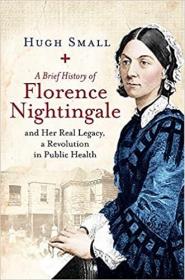
A Brief History of Florence Nightingale: and Her Real Legacy, a Revolution in Public Health
¥ 83 7.2折 ¥ 115 全新
仅1件
广东广州
认证卖家担保交易快速发货售后保障
作者Hugh Small
出版社Robinson
ISBN9781472140289
出版时间2019-05
印刷时间2019-05
装帧平装
开本20开
页数256页
定价115元
上书时间2022-01-09
- 最新上架
商品详情
- 品相描述:全新
- 商品描述
-
Praise for Small's earlier work on Nightingale: 'Hugh Small, in a masterly piece of historical detective work, convincingly demonstrates what all previous historians and biographers have missed . . . This is a compelling psychological portrait of a very eminent (and complex) Victorian.'
James Le Fanu, Daily Telegraph
Florence Nightingale (1820-1910) is best known as a reformer of hospital nursing during and after the Crimean War, but many feel that her nursing reputation has been overstated.
A Brief History of Florence Nightingale tells the story of the sanitary disaster in her wartime hospital and why the government covered it up against her wishes. After the war she worked to put the lessons of the tragedy to good use to reduce the very high mortality from epidemic disease in the civilian population at home. She did this by persuading Parliament in 1872 to pass laws which required landlords to improve sanitation in working-class homes, and to give local authorities rather than central government the power to enforce the laws. Life expectancy increased dramatically as a result, and it was this peacetime civilian public health reform rather than her wartime hospital nursing record that established Nightingale's reputation in her lifetime.
After her death the wartime image became popular again as a means of recruiting hospital nurses and her other achievements were almost forgotten. Today, with nursing's new emphasis on 'primary' care and prevention outside hospitals, Nightingale's focus on public health achievements makes her an increasingly relevant figure.
对斯莫尔早期关于南丁格尔的作品的赞扬:“休·斯莫尔,在一部历史侦探作品的杰作中,令人信服地证明了所有以前的历史学家和传记作家都错过了什么。这是一幅引人注目的维多利亚时代杰出(复杂)人物的心理画像。”
詹姆斯·勒法努,《每日电讯报》
弗洛伦斯·南丁格尔(1820-1910)是克里米亚战争期间和之后医院护理的改革者,但许多人认为她的护理声誉被夸大了。
弗洛伦斯·南丁格尔的简史讲述了她战时医院卫生灾难的故事,以及为什么政府违背她的意愿掩盖了这一事件。战后,她努力将这场悲剧的教训充分利用,以减少国内平民因流行病而造成的极高死亡率。她在1872年说服议会通过法律,要求房东改善工人阶级家庭的卫生条件,并赋予地方当局而不是中央政府执行法律的权力。结果,人们的预期寿命大大增加,正是这场和平时期的平民公共卫生改革,而不是她战时的医院护理记录,在她有生之年确立了南丁格尔的声誉。
在她去世后,战时形象再次成为招募医院护士的一种手段,而她的其他成就几乎被遗忘。如今,随着护理部门对医院外“初级”护理和预防的新重视,南丁格尔对公共卫生成就的关注使她成为越来越重要的人物。
基本信息
出版社 : Robinson; 第 Revised, Updated 版 (2019年5月14日)
语言 : 英语
平装 : 256页
ISBN-10 : 1472140281
ISBN-13 : 978-1472140289
商品重量 : 210 g
尺寸 : 12.7 x 1.91 x 19.69 cm
— 没有更多了 —












以下为对购买帮助不大的评价